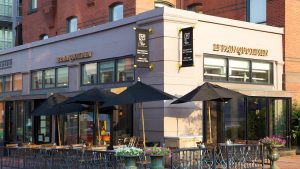Meaningful Mentorship
by Sean Mooney (’22)

When I learned during orientation week that mentors were a potential option for Wake Washington students, I was unsure what to expect as I had only one person outside of my family whom I considered a mentor. I requested Ms. Richwine assign me someone who had a variety of experiences in the policy world, preferably including foreign policy. At the time, I knew next to nothing about the various institutions contributing to the United States’ relationship with other countries but was interested in what I considered a more artsy policy determination process than domestic policy. I first met with the Wake alum Ms. Richwine assigned to me in the first few weeks of the program and got coffee at Le Pain Quotidien (where I currently sit writing this) roughly every other Thursday since then. He works as a U.S. governmental affairs consultant having been involved in diplomacy on behalf of French speaking countries throughout his career.
In my first few meetings with him, I learned everything I could about how U.S. foreign policy is made. I found that it is much more complex and dynamic than I had supposed, I had only considered intelligence sharing, trade agreements, and international organizations, which I assumed were influenced by the CIA, State, and UN ambassadors, with the academic establishment playing some role. I found in my conversations with Jordan that the influences of U.S. foreign policy are much more complex than I had suspected, and that Congress wields almost all relevant power. Nor had I realized the ways in which Congress is influenced, even on domestic policy, so I explored this throughout the semester with Jordan and on my own. My current perception is that coalition building is the critical objective for putting an issue in the sights of Congressional agenda setters and that this process may take decades. These conclusions set the stage for the more important aspects of my mentor meetings, those of receiving advice.
From the initial meeting, we had concluded that if I were to be an effective actor in U.S. foreign policy, I would need to speak another language with native speaker fluency. This was made seemingly impossible given that my opportunity to study abroad has likely been stymied by the pandemic. I came up with potential alternatives revolving around gaining an elementary understanding of a language before I graduate college and attending graduate school or working somewhere internationally, gaining native speaker fluency while building social capital in that country. I know that I ultimately want to apply an understanding of econometrics and political study to my profession and being a primary recourse in U.S. diplomatic or economic engagement with another country seems a useful application. In only seven or so hour long meetings with Jordan, I gained substantial clarity regarding my future and renewed excitement about my studies. I am tremendously grateful for this relationship which the program has enabled.
